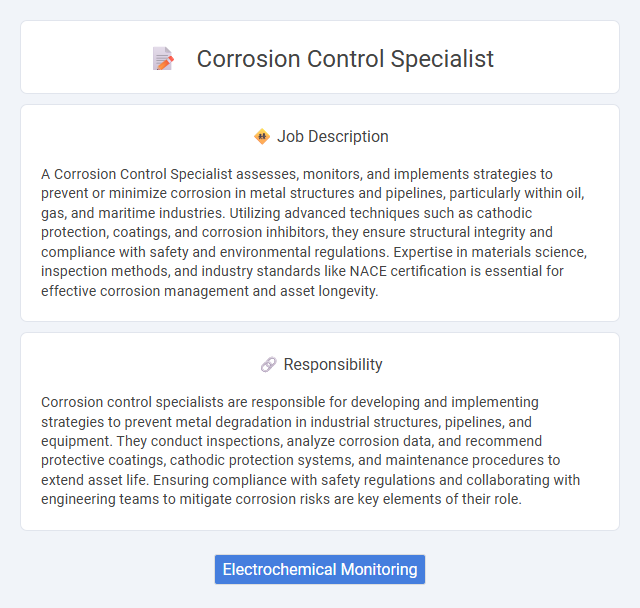
A Corrosion Control Specialist assesses, monitors, and implements strategies to prevent or minimize corrosion in metal structures and pipelines, particularly within oil, gas, and maritime industries. Utilizing advanced techniques such as cathodic protection, coatings, and corrosion inhibitors, they ensure structural integrity and compliance with safety and environmental regulations. Expertise in materials science, inspection methods, and industry standards like NACE certification is essential for effective corrosion management and asset longevity.
Individuals with a strong understanding of chemistry and physics are likely suitable for a corrosion control specialist role, as the job demands analyzing material degradation and implementing preventive measures. Those who are detail-oriented and possess problem-solving skills probably adapt well to the technical and research aspects required in this field. People with limited interest in science or lacking patience for meticulous inspection may find this job less suitable.
Qualification
A Corrosion Control Specialist typically requires a bachelor's degree in materials science, engineering, or a related field, along with certifications such as NACE CIP Level 1 or Level 2 for corrosion inspection and control. Extensive knowledge in evaluating corrosion mechanisms, applying protective coatings, and implementing cathodic protection systems is essential. Proficiency in analyzing metallurgical data and using corrosion monitoring tools enhances effectiveness in maintaining structural integrity in industries like oil and gas, marine, and infrastructure.
Responsibility
Corrosion control specialists are responsible for developing and implementing strategies to prevent metal degradation in industrial structures, pipelines, and equipment. They conduct inspections, analyze corrosion data, and recommend protective coatings, cathodic protection systems, and maintenance procedures to extend asset life. Ensuring compliance with safety regulations and collaborating with engineering teams to mitigate corrosion risks are key elements of their role.
Benefit
Corrosion control specialists likely experience enhanced job stability due to the critical need for maintaining infrastructure integrity across various industries. The position probably offers competitive salaries and opportunities for technical advancement, given the specialized knowledge required. Health and safety benefits might also be emphasized, as working environments often follow strict regulatory standards to protect personnel.
Challenge
Corrosion control specialists likely face the challenge of accurately identifying and mitigating corrosion risks in diverse environments, which can vary widely in severity and impact. They probably need to apply advanced materials science knowledge and use sophisticated monitoring techniques to prevent structural failures. Managing these complexities requires constant adaptation to new technologies and industry standards to effectively prolong asset lifespan.
Career Advancement
Corrosion control specialists play a critical role in preventing material degradation in industries such as oil and gas, maritime, and infrastructure. Career advancement opportunities include progressing to senior engineering roles, project management positions, or specializing in advanced corrosion technologies and materials science. Obtaining professional certifications and expertise in industry standards like NACE or SSPC enhances prospects for leadership and consulting positions.
Key Terms
Electrochemical Monitoring
Corrosion control specialists utilize electrochemical monitoring techniques such as linear polarization resistance (LPR) and electrochemical impedance spectroscopy (EIS) to assess metal degradation rates in pipelines and industrial infrastructure. These experts analyze real-time electrochemical data to design effective corrosion inhibition programs, selecting appropriate coatings and cathodic protection systems to extend asset life. Mastery of electrochemical sensors and data interpretation is essential for optimizing preventive maintenance and reducing costly failures.
 kuljobs.com
kuljobs.com